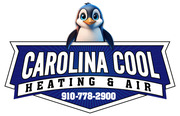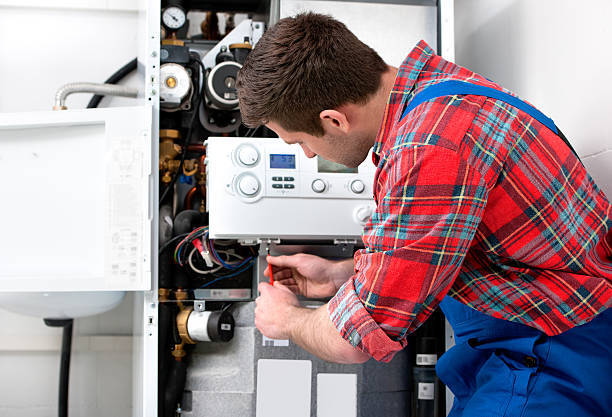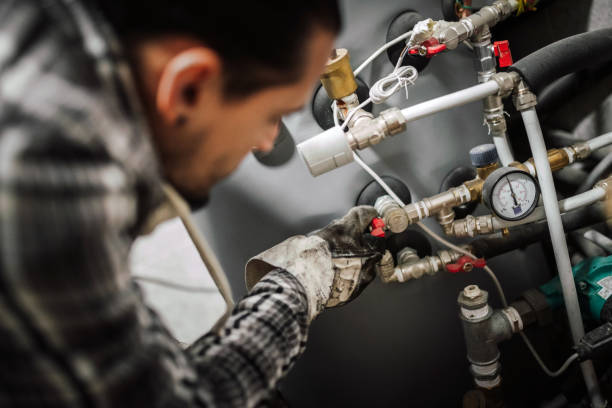When cold weather hits North Carolina, many homeowners rely on their heating system to stay comfortable. But what happens when the heater seems to never shut off? If your heater is running all the time, it could be more than just chilly outdoor temperatures. It might be a sign that something is wrong with your HVAC system.
At Carolina Cool Heating & Air, we want to help families across North Carolina understand why their heater stays on nonstop and what can be done to fix it. Constant heating can raise energy bills, add wear to your unit, and make your home less comfortable. Below, we explain the most common reasons heaters run constantly and provide solutions to help you get your system back on track.
Table of Contents
ToggleThermostat Problems
The first place to look when your heater won’t turn off is the thermostat. The thermostat controls when your heating system runs and how long it stays on.
- Incorrect settings: If your thermostat is set too high, your heater will work harder to keep up. Try lowering the set temperature a few degrees to see if the heater cycles off.
- Malfunctions: Old or broken thermostats may send wrong signals, leaving the heater running nonstop. If the display looks odd or the readings feel off, it may be time for repair or replacement.
- Location issues: A thermostat installed near a draft, sunny spot, or appliance that gives off heat may cause the heater to misread room temperature. This can force the system to run longer than needed.
Carolina Cool Heating & Air provides heating repair and thermostat services across North Carolina. A professional checkup can ensure your thermostat works the way it should.
Dirty Air Filters
Air filters keep dust and dirt out of your HVAC system. But when filters get clogged, airflow slows down. This makes the heater work overtime to reach the set temperature. In some cases, the strain causes the system to run almost constantly.
A simple filter change every 1–3 months can make a big difference. Clean filters not only improve airflow but also boost indoor air quality. Many heating problems in North Carolina homes come down to filters that were neglected for too long.
Poor Insulation and Air Leaks
Even if your heater is working correctly, your home might not be holding the warm air inside. Poor insulation or leaks can cause heat to escape, which makes your system run longer to keep up.
- Windows and doors: Small gaps let heat out, especially in older homes.
- Attics and crawl spaces: Areas with thin insulation lose heat quickly.
- Ductwork: Leaky ducts send warm air into places like attics instead of living rooms.
If you live in North Carolina, where winter nights can get chilly, sealing air leaks and improving insulation helps your heater cycle normally. This not only saves energy but also lowers your monthly bills.
Furnace or Heat Pump Issues
In many North Carolina homes, heaters include furnaces or heat pumps. Mechanical problems inside these systems can lead to continuous operation.
- Furnace problems: Faulty limit switches or blower motor issues may prevent the heater from shutting off.
- Heat pump problems: If the refrigerant is low or the coils are dirty, the system may struggle to reach your thermostat’s setting, running all the time instead.
These problems usually need professional inspection. At Carolina Cool Heating & Air, our HVAC technicians in North Carolina can diagnose and repair mechanical issues to keep your heater running the way it should.
Incorrectly Sized Unit
If your heating system is not the right size for your house, you may notice continuous running.
- Undersized heater: Too small means it cannot keep up with demand, so it runs without stopping.
- Oversized heater: Too big means it cycles on and off too often, which can also appear like constant operation.
Proper sizing is critical for comfort and efficiency. If you have a new system installed recently and notice nonstop heating, the system size could be part of the problem.
Energy Costs of Running Constantly
One of the first signs homeowners notice is a big jump in energy bills. If the heater runs nonstop, it uses much more electricity or gas than normal.
North Carolina families shouldn’t have to choose between staying warm and paying high utility bills. Addressing this issue early with the right HVAC service can cut costs while improving comfort.
How Maintenance Helps
Regular heating maintenance is the best way to prevent problems before they get worse. During a tune-up, HVAC technicians will:
- Clean and replace air filters
- Check thermostat calibration
- Inspect ductwork for air leaks
- Test safety switches and controls
- Examine heat exchangers and coils
Carolina Cool Heating & Air recommends homeowners in North Carolina schedule heating maintenance at least once a year. This keeps your system efficient, extends equipment life, and helps prevent heaters from running too long.
What You Can Do at Home
Before you schedule service, here are a few steps homeowners in North Carolina can try:
- Lower the thermostat by a few degrees to see if the heater shuts off.
- Check and replace the air filter.
- Walk around doors, windows, and attic spaces to check for air leaks.
- Look at your thermostat settings to make sure it isn’t stuck on “Heat On.”
If none of these steps solves the problem, calling a licensed HVAC company is the safest choice.
Final Thoughts
If your heater is running constantly, it’s important not to ignore the issue. In many cases, the cause could be something simple, like a thermostat setting or a dirty air filter, but it can also point to bigger concerns, such as insulation problems or mechanical failures. Running nonstop not only drives up energy bills but also puts extra wear and tear on your HVAC system.
Regular maintenance, filter changes, and sealing air leaks go a long way in preventing these problems. However, if your system continues to run without shutting off, it’s best to have it inspected by a professional. At Carolina Cool Heating & Air, we’re here to help North Carolina homeowners protect their equipment, improve comfort, and save money in the long run.
Frequently Asked Questions
Yes. A clogged air filter restricts airflow, forcing the system to work harder and run longer to reach the set temperature.
Check if the thermostat is set too high, showing incorrect readings, or is placed near drafts or heat sources. These issues can keep your heater from shutting off.
Absolutely. Heat loss through gaps, windows, attics, or duct leaks can make your heater work overtime to maintain the right temperature.
Start by lowering the thermostat a few degrees, changing the air filter, and checking for air leaks. If the problem continues, contact a professional like Carolina Cool Heating & Air for inspection and repair.
Schedule yearly HVAC maintenance, replace filters regularly, seal air leaks, and ensure your system is the right size for your home.




